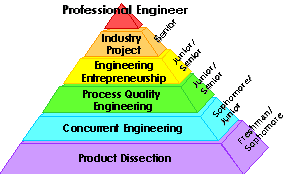





|

The following courses were designed with the objective
of providing the students with a continuous exposure to design and manufacturing from the freshman to the
senior year.
 Product Disection [Lamancusa et al, 1996]: Here students examine the way in which products and machines
work: their physical operation, the manner in which they are constructed, and the design and societal
considerations that determine the difference between success and failure in the marketplace. Product Disection [Lamancusa et al, 1996]: Here students examine the way in which products and machines
work: their physical operation, the manner in which they are constructed, and the design and societal
considerations that determine the difference between success and failure in the marketplace.
Technology-Based Entrepreneurship [Velez et al, 1998]: This course, developed in conjunction with the
Business School, focuses on the starting, financing and managing a new business in a highly competitive and
technological based environment.
Concurrent Engineering [Smith, et al, 1996]; In this course, we present the origin and meaning of the
term concurrent engineering and discuss its role in modern engineering companies.
 Process Quality Engineering [Barton et al, 1997]: Exposes students to the importance of statistical and
probabilistic methods in the current TQM culture. Students learn to apply probability models and statistical
tools to engineering problems. Process Quality Engineering [Barton et al, 1997]: Exposes students to the importance of statistical and
probabilistic methods in the current TQM culture. Students learn to apply probability models and statistical
tools to engineering problems.
Interdisciplinary Capstone Design [Lamancusa et al, 1996, 1997]: The capstone course provides students
with the opportunity to practice design of products, processes and enterprises from conceptualization to
actualization.

Materials for these courses were developed by the Manufacturing Engineering Education Partnership and are
available upon request.
These courses were implemented at each of the partner schools and integrated with existing courses to form
minors or options in Products and Processes Realization. In this new curriculum, the Interdisciplinary Capstone
Design Course, with "real projects" provided by our industrial partners, form the final test of the students'
ability to function in an emulated industrial environment.
|
|

